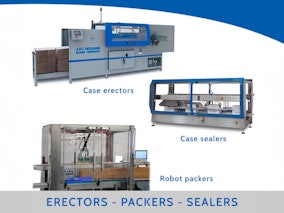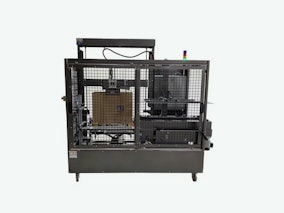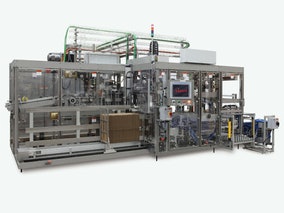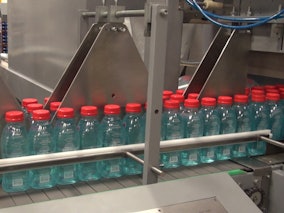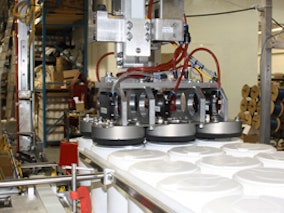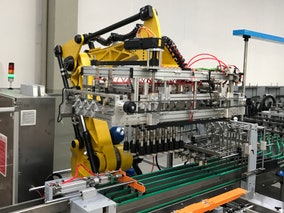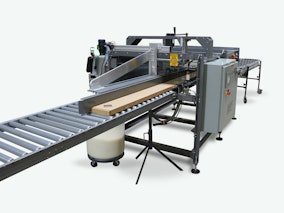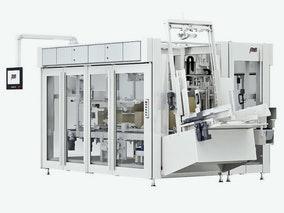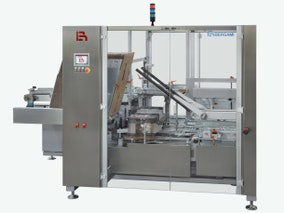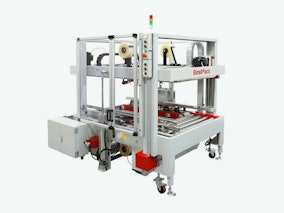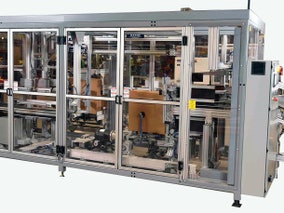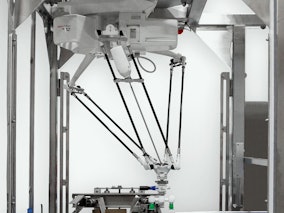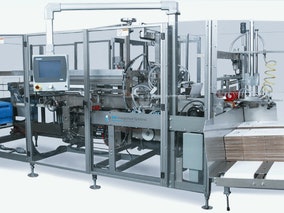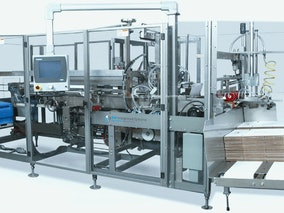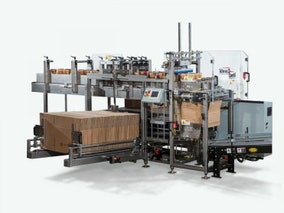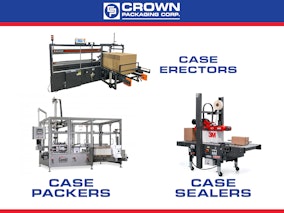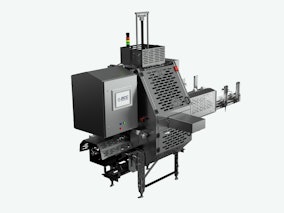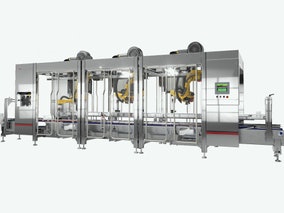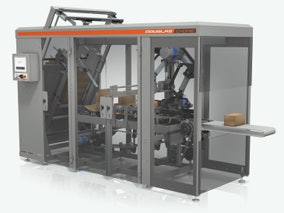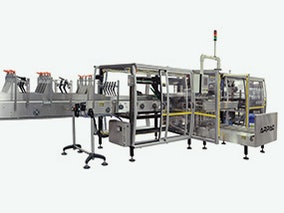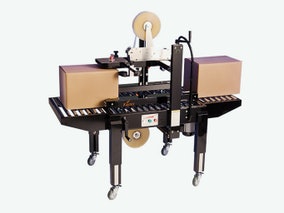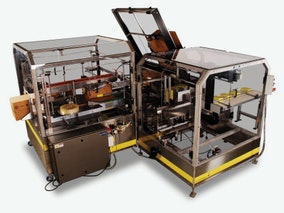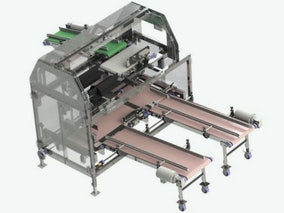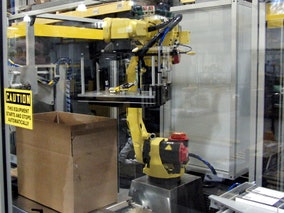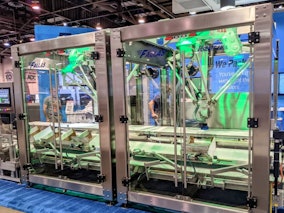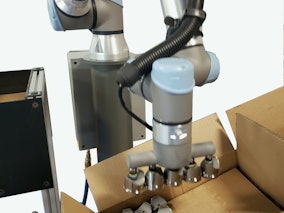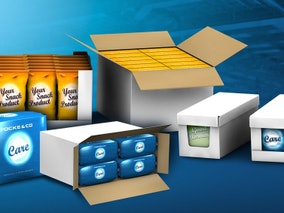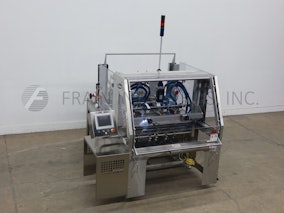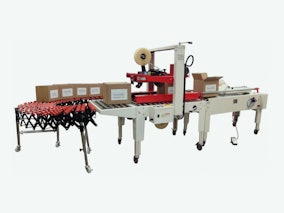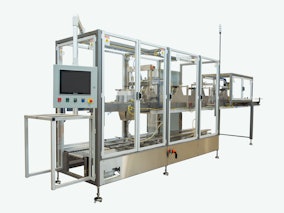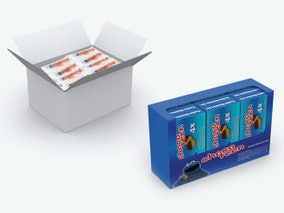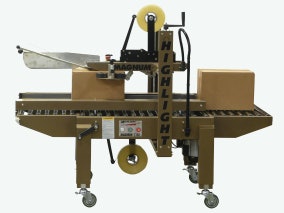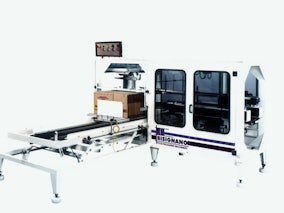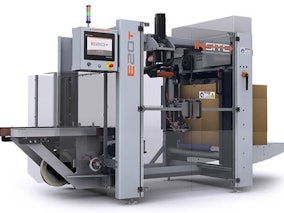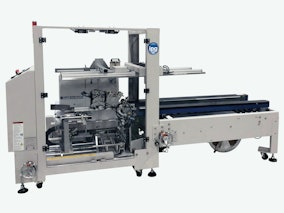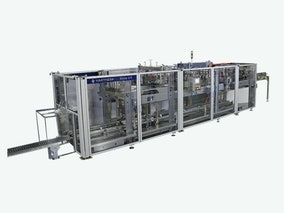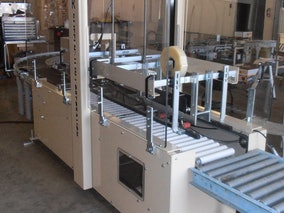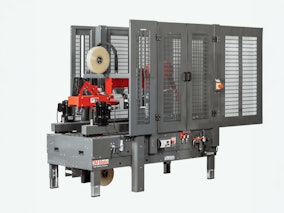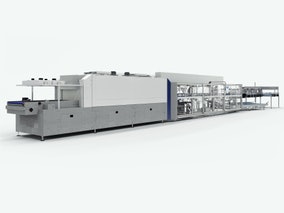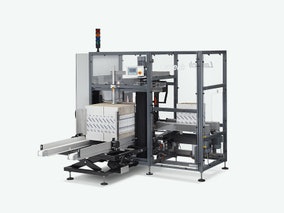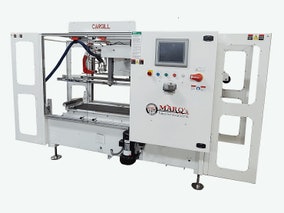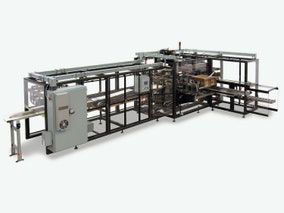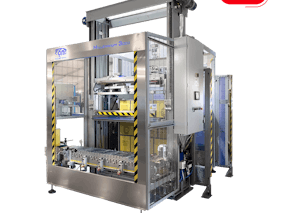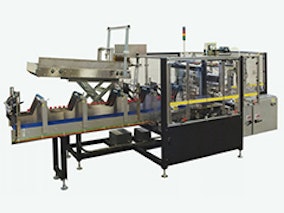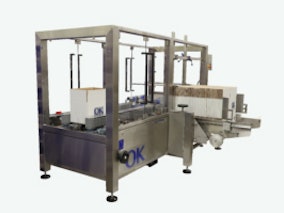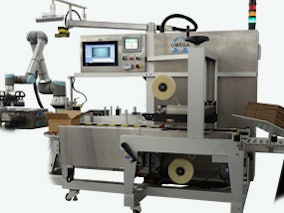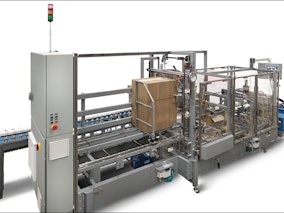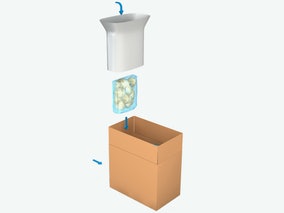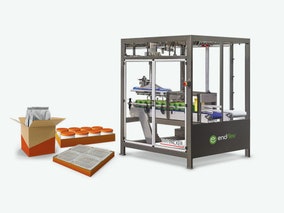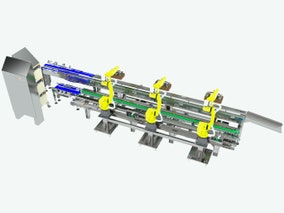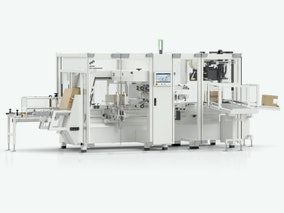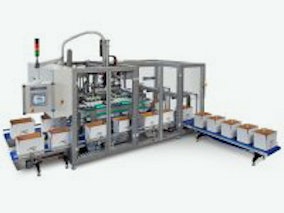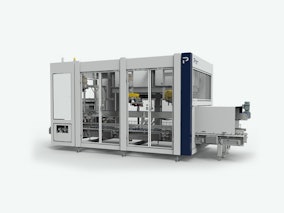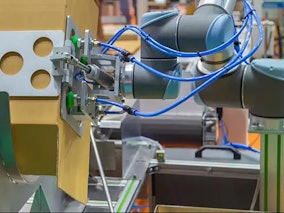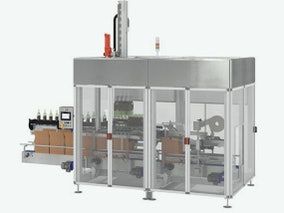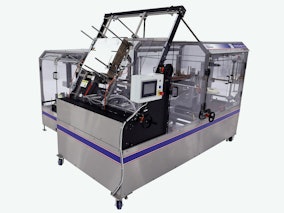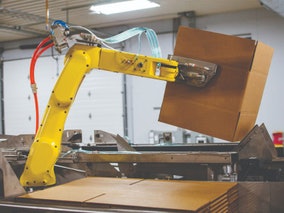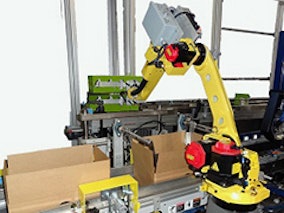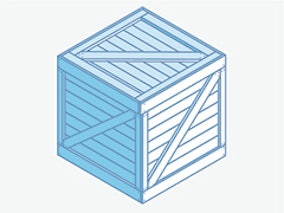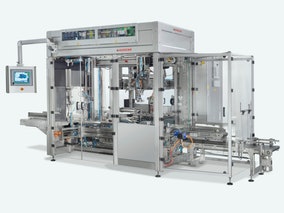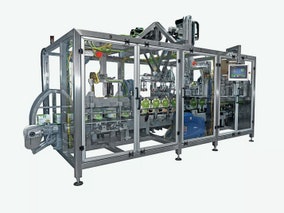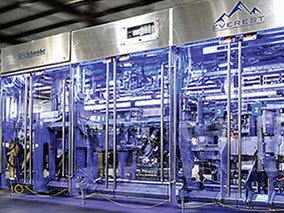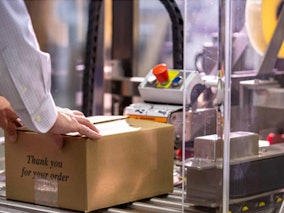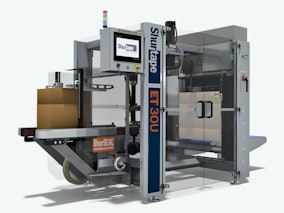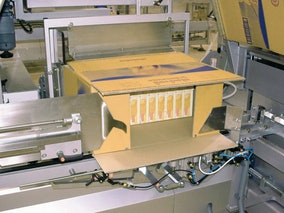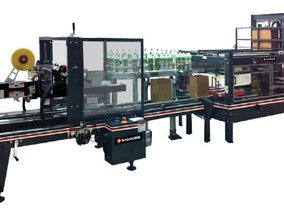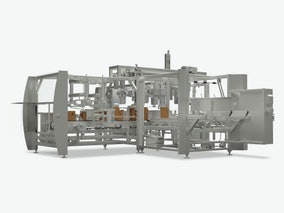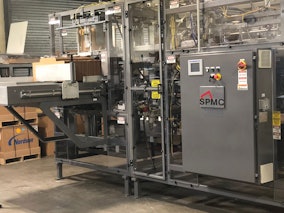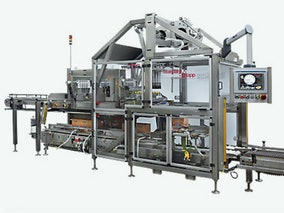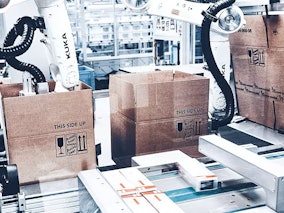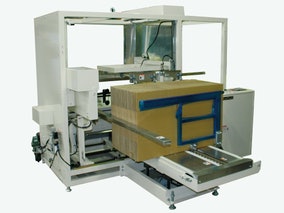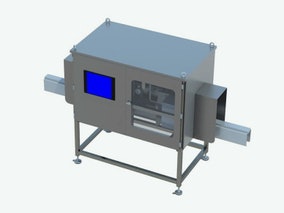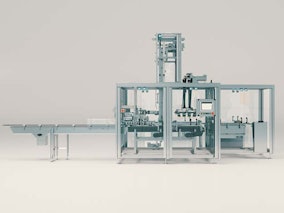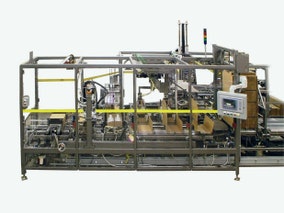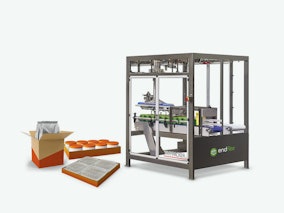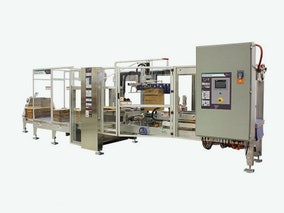Case Sealers
(78 companies)Machinery that closes flaps of a case before sealing it using tape or other adhesives. Looking at new cartoning, case packing, and multipacking machines? Learn more about what to look for in your next purchase.
-

3M
3M-Matic™ case sealers are designed to help customers save money, while improving the packaging process and providing a quality seal. From semi-automatic to fully automatic machines, 3M-Matic™ case sealers are used by companies ranging from start-ups to established brands. Depending on your application, both 3M-Matic™ Adjustable and Random case sealers use the 3M™ AccuGlide™ Taping Head technology, engineered for easy, fast and accurate case sealing. The 3M-Matic™ case sealers can be found in a variety of markets: food and beverage, medical devices, pharmaceuticals, electronics, retail, manufacturing and distribution centers.
You are currently not logged in -

A-B-C Packaging Machine Corp.
A-B-C Packaging Machine manufactures multiple case packing and product handling solutions, including robotic packers, vertical place packers, and horizontal packers, plus case erectors and case sealers. Designed for precise and gentle product handling to ensure top product integrity throughout handling and distribution, machines feature quality construction, simple and intuitive controls, quick changeovers and low maintenance designs, ensuring reliable performance for current and future needs.
You are currently not logged in -

A. B. Sealer, Inc.
A.B. Sealer specializes in case erecting and case sealing machines. The MAXIMUM Series of automatic case erectors is designed as a cost-effective alternative to hand forming or using cumbersome machines. Engineered for fewer steps and moving parts, A.B. Sealer’s case erectors emphasize simplicity. Highlighted case erectors include the Maximum 5 Series, running up to 15 cases/min. The CE-563 is a semi-automatic case erector/pack station that has both automatic and manual modes; when connected to any case sealer, it enables one person to form, pack and seal corrugated cases in a single operation. The D-662 semi-automatic case sealer is designed for applications where previously erected cases are loaded and flaps are manually closed. TB-652 is a semi-automatic case sealer for standard sized cases, featuring top and bottom drives, four belts to positively control cases, with manual flap folding.
You are currently not logged in -

Aagard
Aagard Acclaim® Knock Down case packer handles a wide range of products, including thermoformed trays and cartons. Case packing machine can orient products for the desired case pattern by either tipping or not tipping the collated products via changeover. Robust, servo-driven system is designed for high-efficiency in end-of-line packaging applications.
You are currently not logged in
-

Accutek Packaging Equipment Co., Inc.
Accutek's case packing machines are designed for easy integration into existing packaging lines, allowing for seamless operations and increased efficiency. They can be customized to meet specific requirements, accommodating various case sizes, pack patterns, and product configurations. By utilizing Accutek's case packing equipment, businesses can streamline their packaging operations, improve productivity, and achieve consistent and reliable case packing results.
You are currently not logged in -

AFA Systems Ltd.
AFA Systems' case packers feature an innovative gantry robot case erecting technology, which is designed to couple with ergonomic case magazine design for high-end efficiency on the end user's packaging lines. Top load, end load, and wraparound case packers include our all-servo changeover feature, yielding changeover in less than five minutes. Examples of recently completed projects include one line that runs up to 80 cpm and developing a combination system with case packing and palletizing cells.
You are currently not logged in -

APS Packaging and Automation
APS Packaging & Automation makes the Accupack 1/2 case packer, designed with adjustable keeping head that has a maximum excursion of bottles diameter of 50-125 mm. Case packer comes complete with accessories suitable to work bottles formats with diameters between 60 and 105 mm by just changing special plates for each different bottle diameters and cases format to work. Features include single-column structure and arm-powered movements move up and down to pick up and lay the bottles into the cases. The movement of the heads (back and forth on the arm) is controlled by an inverter to ensure gentle handling of the containers.
You are currently not logged in -

Astro Packaging
Astro Packaging manufactures several models case sealers, case erectors, case packers and a wide variety of related automated packaging solutions. Featured case packers include the Model 34 Side Sealer, designed for sealing the long edge of boxes in specialty applications such as bed frame, book shelf and floor manufacturing. Astro Packaging’s Liberty Series™ Bottom Load Case Packer is built for compactness and flexibility in the plant. The bottom load case packer machine is a good fit when a product must be kept upright when case packed and drop packing is not an option. The Freedom Series wrap around case packer can run up to 35 cases per minute maximum line speed. Astro can also build custom machines for specialized box sizes or adjustable machines that accommodate multiple box sizes.
You are currently not logged in
-

B&B Packaging Technologies
B&B offers a variety of different solutions in case packing, tray, tray with lid, wrap-around or RSC case packaging options for the effective protection for the transport and storage of products. B&B’s Universa is a fully automatic case packaging machine which erects and fills up to 15 cpm in a top load, pick-and-place process before closing cases with hot-melt or adhesive tape. Suitable for the end packaging of glasses, bottles, cans, coils, molded bottles and other kinds of products suitable to be transported using vacuum grippers. The B&B Combimatic tray and wrap-around case packaging machine is a servo-mechanical system which fills product and closes/seals with hot-melt glue from flat carton blanks. Bottom trays, high board trays with U-shaped or tray-lid and wrap-around cases are all packaging options offered with the Combimatic at speeds of up to 25 cycles/min. The Kartomat KVA series from B&B is designed to fill and seal RSC type corrugate cases with a wide variety of products including, folded cartons, cylindrical products (garbage bag rolls, wallpaper rolls, stacked cans) and paper products. Closing options of hot-melt and adhesive tape at speeds of up to 30 cpm are possible. B&B case filling equipment can be combined with B&B film wrappers or shrink tunnels in a seamless, complete end-of-line packaging operation.
You are currently not logged in -

BERGAMI USA
Bergami manufactures both horizontal and vertical self-contained case packers. The K15/20 casepacker is a compact, fully automatic side-loading casepacker, while the VK10 vertical top loading casepacker platform features positive case control and a multitude of robotic loading solutions. Bergami also offers casepacker/palletizer systems in a monobloc design for simple integration and when floor space is at an absolute premium.
You are currently not logged in -

BestPack Packaging Systems
Bestpack Packaging Systems specializes in carton and case erecting and sealing machinery. The BestPack™ CT4E Series is a fully automatic random four outer edge sealer for cases and large cartons. These sealers are designed to eliminate costly hand taping of the four outer edges of randomly sized cartons where pilfer proofing and protection of product from the outside environment is necessary. The unit includes a front side entry for a 90 degree directional container turn before entering into the four edge sealing station.
You are currently not logged in -

BMG
The NAS ComPack series case packer is designed for applications where floor space is limited. Packer is designed to erect cases and pack product sequentially within the same machine. The unit is designed to handle a wide range of products produced from either plastic or paper with user friendly controls and available in top and/or side load or fed from multiple lanes. The case packer can be configured with many options to meet end-of-line needs.
You are currently not logged in
-

Boston Conveyor & Automation (An Mpac Group Company)
Specialty robotic case packing systems by Boston Conveyor & Automated are designed specifically for customer applications. Systems are available with stainless steel construction for wet environments.
You are currently not logged in -

BW Integrated Systems
BW Integrated Systems has a broad portfolio of case packer machines and tray packing solutions for virtually every segment of the consumer-packaged goods industry for applications including packing flexible bags, rigid packages, and cartons in many formats and speed ranges. Machinery includes top-load case and tray packers, side-load case packers, wraparound packing, as well as high-speed case and tray packing. BWI also provides case packers for bottles, cans, cartons, flexible bags and pouches. BW Integrated Systems also offers a complete case packing line.
You are currently not logged in -

BW Packaging
BW Integrated Systems has a broad portfolio of case and tray packing solutions for virtually every segment of the consumer-packaged goods industry. BW Integrated Systems provides case packing systems for flexible bags, rigid packages and cartons in many packaging formats and in a variety of speed ranges. Case packing machines include top-load case and tray packers, side-load case packers, wraparound packing, high-speed continuous motion tray packing and high-speed continuous motion case packing.
You are currently not logged in -

Combi Packaging Systems LLC
Combi Packaging Systems supplies an array of case packing equipment including drop packers with integrated case erectors, stand alone case packer for packing rigid containers, pick-and-place case packers, beer bottle case packers, as well as side load and horizontal case packing models. Featured models include the DP Drop Packer, a drop packer with case erector designed as an ultra-compact solution for packing the widest range of rigid containers. Exclusive design integrates a case erector and case packer into the smallest footprint in the industry for reliable case packing productivity.
You are currently not logged in
-

Crown Packaging Corp.
Crown Packaging distributes case forming, case packing, and case sealing equipment, offering a wide range of machinery from top manufacturers such as Robopac and Combi.
You are currently not logged in -

DCC Automation
DCC Automation offers cartoning and case packing systems designed to provide speed, precision, and flexibility in packaging operations. Built with hygienic stainless-steel construction and engineered for durability, these systems handle a variety of products—including bottles, cartons, and specialty containers—to ensure secure and consistent packing. Options range from semi-automatic units to fully integrated systems that streamline end-of-line packaging, support labor efficiency, and maintain product integrity. The Evolution Line of servo-driven casers, including the Auto-Pack, Slant, and Round Bottle Casers, is developed for hygienic, high-performance automation. Expert service and aftermarket support are also available to help ensure reliable, long-term operation.
You are currently not logged in -

Delkor Systems, Inc.
Delkor is a US-based case packing manufacturer with a focus on vision-based robotic case packers, offering many options to end users packing rigid and flexible products. With 8-minute changeover, Delkor case packers can load into trays, HSC cases, RSC cases, flange seal cases, club store trays and more, all on the same line.
You are currently not logged in -

Douglas Machine Inc.
Douglas Machine offers case packers and tray packing machines for a wide range of applications. Featured machines include the CpONE™ case packer, designed to offer simplicity in operation and maintenance as well as scalability for different applications, speeds and investment levels. Configurations available to match any speed requirement between 5 to 45 cpm. The Axiom® IM case packer and tray packer offers speed and efficiency for demanding applications, handling up to 45 cases or trays/minute. Features include intermittent motion as well as custom inline, right angle or counter flow infeed options.
You are currently not logged in
-

Duravant
Duravant case and tray packers are designed for high-production packaging of metal cans, paper cans, glass jars, glass bottles, plastic bottles, bags and other products. Widely used in major industries such as food and beverage, automotive, personal care, household products, pharmaceuticals and hardware, these machines are designed for easy integration with existing packaging lines. Tray packing equipment and case packing equipment utilizes minimal amounts of shrink film and corrugated, often resulting in substantial material cost reduction. Case and tray packers usually require no inserts or partitions to hold products in place, further decreasing expenses and simplifying the packing process.
You are currently not logged in -

Eastey
Eastey Enterprises’ line of case packing equipment includes case erectors and sealers. The ERX-15 case erector from Eastey is designed to automatically erect and seal the bottom of cases at production rates up to 15 cpm, providing fast, efficient case erecting while providing an alternative to manual case forming. Sealing equipment ranges from the simple and effective BB-2 to the semi automatic uniform SB-2EX Auto. Eastey offers several models of uniform case tapers and the SB-2EX, a machine that handles random cases. Taping speeds for case sealing equipment can reach up to 30 cpm.
You are currently not logged in -

Econocorp, Inc.
Econocorp offers manual, semi- and fully automatic case packers at speeds of up to 15 cpm. Econocorp’s semi-automatic horizontal case packers, automatic carton packers and wraparound systems for cartons, trays and cases are designed to meet high quality standards. Machines are engineered with a focus on user-friendly functions that are simple to operate and provide cost-effective maintenance for clients.
You are currently not logged in -

Emerald Automation, LLC
Emerald Automation offers case packing machines for a wide range of packaging applications, from packing flexible, vertical and stand up pouches and bags to flat case packing as well as loading bulk primary products into poly-line cases. Emerald’s Dash and DASH VP case packers place bags in cases vertically, while the DP (Drop Packer) model, available for larger bags, cases bags in a flat or horizontal orientation. Top, bottom, end and side load designs are available, as are gantry and robotic options. Emerald also offers case former/erector machines.
You are currently not logged in
-

ESS Technologies, Inc.
RSC and wraparound case packers are engineered for top-loading, side-loading and bottom-loading applications.
You are currently not logged in -

Fallas Automation, Inc.
Fallas Automation supplies a range of case packing equipment including packers, sealers, and related equipment. The newly redesigned Fallas Adabot LV MKII is built to handle all of single stack, retail ready, vertical SUP, and lay-flat products all on one machine. Other featured case packing equipment from Fallas Automation's product line include the R400, which packs flexible bags, rigid and semi-rigid trays, cartons,, the G400 Case Packer, a gravity case packer, and the CS400 case sealer, one of the smallest footprints and available in tape or glue.
You are currently not logged in -

Flex-Line Automation Inc.
Flex-Line Automation Inc. supplies case packing machinery along with case erecting and palletizing, working with multiple robot manufacturers. End-of-arm tooling is customized for the specific product, and in many applications, it can be designed to allow the same robot to perform both case erecting and case packing without changeover, depending on cycle time requirements.
You are currently not logged in -

FOCKE & CO
Focke & Co. offers case packing technology combined with robot handling. The top load case packer Model 494 for the hygiene, tissue, food and consumer industries features integrated handling robot able to pack various types of products, such as wet wipes in flow packs, tubs, or zip-packs into cases. Side load case packers in the 459 model range are designed for versatility and can be used for a variety of products and case types.
You are currently not logged in
-

Frain Industries
Frain Industries supplies plug-and-play, production-ready casing machinery that is in stock, thoroughly tested, and ready for factory acceptance testing (FAT) in as little as one week. Available equipment includes case erectors, bag inserters, case packers, case sealers, combination case erectors/packers/sealers, robotic case packers, ErgoPack case erectors and sealers, tray erectors, and tray sealers, with over 250 units in stock. Designed for seamless integration into production lines, these machines support efficient and reliable case forming, packing, and sealing for various applications. With flexible rental and purchase options, Frain Industries provides immediate solutions for businesses needing casing equipment.
You are currently not logged in -

Garrido USA
Garrido USA supplies several models of case packing equipment including case erectors and case sealers. Featured here is the Eco Tape Semiautomatic Case Former and Sealing Line, a combination of semiautomatic case erector (Model CE-10M), a semiautomatic case sealer (Model CS-TD) and a flexible conveyor that includes 8 legs with lockable castors. This system allows a single operator to form the case, fill and seal it. This economical solution was designed to save companies labor cost in the final packaging stages of their production.
You are currently not logged in -

Hamrick Packaging Systems
Hamrick’s line of casepacking equipment includes all-servo drop packers, gantry-style pick-and-place and robotic case packers for flexibility across applications and customer needs.
You are currently not logged in -

Harpak-ULMA Packaging, LLC
Harpak-ULMA Packaging LLC is a supplier of case formers, sealers and label applicators, offering a faster, more accurate and reliable approach to manual efforts, which often result in sloppy or poorly placed tape or labels. Manual labor at this stage often requires substantial space for workstations and materials storage, whereas automated equipment at the end of a packaging line can actually reduce required warehouse space.
You are currently not logged in
-

Highlight Industries
Highlight Industries is a supplier of case packing equipment including the Highlight Magnum. This case handling system comes in a range of styles and automation packages to suit the customer’s needs, featuring side belt drives, top and bottom belt drives, random size modes and uniform modes. Case formers are available with top and/or bottom flap folding options.
You are currently not logged in -

IGPR Inc.
Industrias GOLDPACK S.A. distributes case case forming and sealing equipment from Bisignano. Equipment can be adjusted to fit different sizes of boxes. Systems feature a bottom sealing design, with hot melt sealing options available.
You are currently not logged in -

INSITE Packaging Automation
INSITE’s case erectors and case sealers are designed to respect vital resources: time, budget and operator safety. Engineered for simplicity, reliability, effortless setups, and quick and trouble-free changeovers, INSITE case erectors feature Rockwell-controlled robotic pick-and-pass mechanisms, 40 to 50 percent fewer parts than competing machines, dependable opposing-cup case opening design and active case squaring for square cases. INSITE case sealers boast a clean, minimalist design, despite having numerous functions and features designed to improve the overall case sealing process for customers. Standard features on INSITE case sealers include major flap control, touchscreen controls, full-length guard doors, tilt-accessible tape heads and spring-loaded side belts.
You are currently not logged in -

IPG
Intertape Polymer Group (IPG) offers a range of case erectors and sealers designed to enhance packaging efficiency. IPG’s case erectors automate the forming and bottom-sealing of corrugated cases, improving productivity and reducing manual labor. These machines handle various case sizes and styles with quick adjustments for high-demand operations. IPG’s case sealers include random semi-automatic models that accommodate varying case sizes without manual input, ensuring secure and consistent sealing.
You are currently not logged in
-

ITW Hartness
ITW Hartness offers versatile case packing systems for a variety of packaging types, including top load drop packing, tray, and wraparound solutions for medium- and high-speed applications. An ITW Hartness staple for almost 50 years, top load drop packing systems include Model 875 is a workhorse with reliable operation for medium-speed applications. Hartness’ high-speed unit is Model 2800, which includes servo motors with precision control, fast motion, gentle product handling and increased flexibility. For wrap-around applications, the HTW/TP tray and wrap-around packer forms low and product-high trays as well as wrap-around cases and RSC-cases for food and non-food applications. Continuous motion offerings include the Model 2650, which provides a robust crate/tray packing solution for Beverage customers. ITW Hartness also supplies extension equipment for case packing lines such as laners and sealers in an array of standalone, modular, and blocked configurations.
You are currently not logged in -

Klippenstein Corporation
Klippenstein Corporation is an OEM of numerous case/tray forming, case erecting and case sealing machines. K730HM and K730TH are fully automatic top-only case sealing machines running RSC or FOL style cases at 20 cases/min. K400HM and K400TH are semi-automatic, bottom-only RSC case sealing machines, featuring a crank adjust for quick changeover.
You are currently not logged in -

Korpack
Korpack is a supplier of a range of 3M-Matic™ case sealers engineered to automate and streamline end-of-line operations. Manual-adjustable flap-folding models stabilize and center cartons weighing up to 85 lb, folding top flaps before taping at speeds up to 40 cases per minute using Scotch® 2″ tape heads. Bottom belt models seal uniform boxes in widths from 6″ to 21.5″ and heights from 4.75″ to 24.5″ at similar speeds, offering robust steel construction and reliable tape application. Side belt adjustable versions accommodate narrow-profile cartons, applying tape without damage through spring-loaded belt design and AccuGlide™ taping heads. Korpack sells case sealers that suit both semi-automatic and manual operations, reduce labor costs, provide consistent sealing quality, and are supported with installation, preventive maintenance, and spare parts services.
You are currently not logged in -

KRONES
The fully-automatic Variopac Pro packer is designed to easily adapt to packaging trends. Packaging with pads, in trays, or wrap-around cartons, if with, without or exclusively in a shrink-wrapped film, the different models of the Variopac Pro cover a wide range of packaging variations. The modular machine design offers flexibility for producing many packaging variants.
You are currently not logged in
-

Lantech
Lantech manufactures a wide range of case erecting and case sealing equipment. Case erector models include the C-2000, a customizable system that forms up to 25 cases per minute and accommodates larger case sizes. The C-1000 erects up to 30 square cases per minute. Lantech also offers case sealers handling all types of flutes, double wall and single wall formats, as well as most common case sizes for random, tape-only and customized applications.
You are currently not logged in -

MARQ Packaging Systems, Inc.
MARQ Packaging offers a product line including numerous case erectors, case sealers and tray formers. Case erectors include the HPE-220, designed for space-restricted areas, featuring an ergonomically-friendly continuous-feed stack hopper that is adjustable to accommodate several case sizes. Automatic case sealers include the HPA side belt drive top and bottom case sealer and the ET Series sanitary design case sealer featuring an adjustable hand crank system with easy to read ruler scales for precise adjustments. Tray formers include the HPT-S tray former with a bundle feed hopper that allows the operator to load tray blanks easily with no overhead lifting.
You are currently not logged in -

Massman Companies
Massman Automation Designs makes case packing solutions for every application. Ranging from small footprint, low-speed applications to large high speed continuous motion case packers, Massman Automation's case packers handle wraparound, RSC knock down, harness style, and tray blanks.
You are currently not logged in -

Newmapak Ltd.
Newmapak has more than 50 years of experience in the design, construction, and supply of packaging machines for the wine, beverage, food and industrial sectors, including case packing equipment. Visit Newmapak's link below to contact the company about its end-of-line case packing equipment.
You are currently not logged in
-

nVenia, a Duravant Company
nVenia, a Durant Company, makes case and tray packers for high-production packaging of metal cans, paper cans, glass jars, glass bottles, plastic bottles, bags and many other products. Widely used in major industries such as food and beverage, automotive, personal care, household products, pharmaceuticals and hardware, case packing equipment is easily integrated with existing packaging lines. Arpac Brand tray packing equipment and case packing equipment utilizes minimal amounts of shrink film and corrugated, often resulting in substantial material cost reduction. Case and tray packers usually require no inserts or partitions to hold products in place, further decreasing expenses and simplifying the packing process. Automatic case and tray packers relieve packaging line employees from repetitive and sometimes strenuous work, enabling them to focus on more productive activities. Some standard models are capable of handling 60 packages per minute. Shrink-wrapped cartons and trays hold products securely in place, even heavy items such as canned foods and bottled beverages. Shrink film is strong enough to resist puncturing and withstand rough handling.
You are currently not logged in -

OK International Corp.
OK International's case packing equipment solutions include their Superformer Case Erectors and Supertaper Case Sealers. The Superformer Case Erectors are heavy-duty, stainless steel machines designed for quick and easy size changes, enhancing production efficiency. They feature automatic case squaring and are available in models like SF1, SF1-HM, and SF3, accommodating various case sizes and sealing methods. Complementing these, the Supertaper Case Sealers provide both automatic and semi-automatic options for securely sealing case tops with tape or hot-melt glue. Models such as ST1A, ST1M, and ST1X are built with stainless steel exteriors, ensuring durability and suitability for demanding applications across food and non-food industries.
You are currently not logged in -

Omega Design Corporation
Omega's Intelli-Pac is the premier end-of-line case packing and aggregation solution. Intelli-Pac's flexible platform supports many semi-auto assist technologies used in case forming, case labeling, case layer inspection and case sealing. In addition, the Cobot Pack Assist for the Intelli-Pac is an integrated collaborative robot that enables smarter, faster case packing.
You are currently not logged in -

Pacteon Group
Schneider Packaging Equipment, a Pacteon Company, manufactures case packing machinery including horizontal, vertical bottom loading, robotic and gable top case packing systems. ESS Technologies, also part of the Pacteon Group, supplies RSC and wraparound case packers engineered for top-loading, side-loading and bottom-loading applications. Schneider’s horizontal case packers are designed to be versatile, intuitive and efficient, capable of accommodating RSC, HSC, trays, and wraparounds; a high-speed horizontal case packer model is also available. The Everest vertical case packer is designed for gentle product handling, offering a conventional alternative to pick-and-place systems. For high rates, Schneider’s robotic case packers utilize FANUC robots and vision-guided systems for applications in regular slotted cases (RSC), display cases (HSC), or trays. Schneider’s gable top case packers can be designed as horizontal or bottom load and will pack half gallon gable top cartons into corrugated containers.
You are currently not logged in
-

Pattyn, A Duravant Company
Developed for the specific needs of the industrial bakery and pastry sector, Pattyn North America's Odyssey case packer drops bags of baked goods from a bagging machine into a box or cardboard tray. Designed to be reliable and robust, the system offers a unique dropping height adjustment to fit the box height and minimize the drops of the bags. Case packing system handles up to 50 bags/min, up to 40 drops/min and 20 boxes/min. In addition, Pattyn supplies dedicated bag inserting equipment for inserting poly bags into boxes, crates, or other containers.
You are currently not logged in -

Paxiom Automation, Inc.
Paxiom Group offers a variety of case packing machines for your production line that are tailored to fit specific product requirements, available space and budget. Systems include a multi-axis, modular robotic pick-and-place case packing cell that can fit into any existing production line or can be integrated as part of a complete packaging solution to include automatic case erecting, tray forming, sealing and robotic palletizing. Paxiom Group’s gravity drop packing solutions are designed to case pack a wide variety of products packaged in pouches, bags, cartons, boxes, jugs and containers. Paxiom also offers side and bottom load case packers as well as semi automatic case packers combining case erecting, hand packing and tape sealing into a compact and efficient work cell. In addition, Paxiom also designs an automated end-of-line system to integrate with its upstream machines on existing lines.
You are currently not logged in -

Pearson Packaging Systems
Pearson’s robotic top-load case/carton packing equipment is available in standard and configurable options. Handling a wide range of rigid and flexible products that can be loaded at a range of rates and into various case styles, Pearson robotic case packers often incorporate advanced technologies such as vision and line tracking, application-specific end-of-arm tooling, and automatic changeover to meet customers’ unique product packing needs. In addition, Pearson’s robotic partition inserters pick and place chipboard or corrugated partitions into empty or full cases to separate delicate items such as glass or cans. Single, dual, or three-robot models are available to offer speeds of 20, 38 or 55 partitions per minute. Pearson's poly bag inserters and bag uncuffers also help enhance the efficiency of weigh filling equipment.
You are currently not logged in -

Pester USA Inc.
Pester’s case packing systems are designed for pharmaceutical and consumer applications. Case packers are available in rectilinear, large-scale and frameless design. Formats include low and high speed, fully automatic, and three-function (case erection, case load, and case close). Line of case packing equipment includes the PEWO-form SLC D20, a side-loading system designed for economy, efficiency and safety in pharmaceutical applications.
You are currently not logged in
-

PPi Technologies Group
PPi Technologies and RadPak offer a full range of packaging systems covering tray formers, case erectors and end of line case packers. PPi's RadPak case packer series automatically assembles and groups products prior to automatically packing them into cases and trays. PPi Technologies also offers a full range of side load packers.
You are currently not logged in -

Premier Tech Systems and Automation
Robotic case packing machines from Premier Tech are designed to be reliable and flexible systems that pick and pack products of different shapes into cases and trays. Depending on the complexity of the customer’s needs, Premier Tech can supply a standard pre-engineered or a customized robotic case packer that provides the equipment that is best suited to the customer’s specific needs. Robotic case packing machines from Premier Tech are engineered to significantly reduce labor costs and increase your productivity.
You are currently not logged in -

Process Control Automation, Corp
PCA Corporation offers robotic case packing systems capable of automating the loading of products into corrugated cases. These solutions integrate six-axis robots with vision systems and custom end-of-arm tooling to pick, orient, and insert items into cartons. The systems support mixed-case configurations and enable pattern flexibility without mechanical changeovers, making them well suited for food, beverage, consumer goods, and industrial packaging lines.
You are currently not logged in -

Prospero Equipment Corporation
Prospero distributes case packing equipment including the FORM 1200 HM/NS case erecting machine from APE. This fully automatic case erecting machine shapes American style cartons and seals bottom flaps via a Nordson hot melt gluer (HM version) or by adhesive tape (NS version). Designed to be sturdy and simple to use, this case erector features a quick format changeover, thanks to the system's simple and practical adjustments on graduated scales using a hand wheel.
You are currently not logged in
-

ProSys Fill LLC.
The ProSys PC10, PC14, PC30 and PC10/30 are compact side load case packers and sealers for automatically packing a variety of 10-, 14- or 30-oz fiber or plastic cartridges of products like sealants, adhesives and greases into various pack patterns.
You are currently not logged in -

Quest Industrial
Quest supplies a range of robotic case erecting and sealing equipment, as well as robotic top load case packing systems. The Quest Quik Pick QP200 is a robotic top load case packer optimized for products in flexible packaging. The Quik Pick uses the Fanuc vision system to identify, locate and track incoming products on the conveyor eliminating the need for complex infeed systems and minimizes changeover downtime. Quest's Quik Case Erector is designed for direct food handling washdown environments, constructed of 304 or 316 stainless and incorporates an open design for ease of maintenance and washdown. The Quik Case Sealer is a fully automatic case sealer for washdown environments that can be integrated with conveyor case weight management systems; it reaches speeds up to 20 cases/minute.
You are currently not logged in -

Remtec Automation, LLC
Remtec’s custom automated robotic case packing systems run at speeds from 5 to 240 ppm. Designed to improve the speed and flexibility of packaging operations, Remtec’s case packing robots feature highly reliable case erectors and sealers, which are available in a wide range of tape-seal and glue-seal configurations. In addition, Remtec’s case handling conveyors and flap management systems are designed for maximum reliability and adjustability over a wide range of SKU’s. Robotic packing systems are all equipped with standard Allen-Bradley controllers, which eliminate the need for robot programming expertise on the packaging floor. A simple touch screen operator interface is provided so that the system can be operated without specialized training.
You are currently not logged in -

Rexfab
Through a partnership with SR Pack in Denmark, Rexfab offers the BXF Standard for fully automated case loading. This reliable machine packs a wide range of bread products and bag closures with quick and easy adjustments for changing patterns. BXF Standard handles bags closed with clip bands, welded bags, paper bags, and open-ended bags reflecting the traditional craft of the artisan baker. Typical products used with this case packer include sandwich bread, buns, hot dog and hamburger buns, bagels and English muffins.
You are currently not logged in
-

ROBOPAC / OCME / TopTier Palletizers
With capacities of 20 to 85 PPM, Robopac USA’s industrial case packer machines and wraparound case packers offer reliable performance, ease of changeover, and low total cost of ownership. Using advanced technology, most of these high-quality case packer machines come with Allen Bradley components and UL certification. Flexible facilities are better equipped to adapt to industry changes, supply chain fluctuations, evolving customer demands, and other challenges. Investing in versatile machinery is crucial for creating a resilient workflow. Wraparound case packing systems that offer multiple formats—including film only, pad and film, tray and film, and wraparound cases—are essential for handling a variety of products effectively.
You are currently not logged in -

ROVEMA North America, Inc.
ROVEMA offers a wide variety of case packing solutions depending on the needs of customers’ products and retailers’ demands. Specializing in handling flexible bags/pouches into cases, ROVEMA manufactures end-of-line case packers that can be fully integrated with the rest of a packaging line. Products are engineered to help navigate evolving retailer demands like mixed case packing, with fast and simple format changeovers and high accessibility.
You are currently not logged in -

Rychiger Canada
Rychiger Canada designs automatic and robotic case and tray packing equipment, including single cell case packers, single tray packers, tray formers, and robotic top loaders for cases, trays and cartons. Highlights from the Nuspark line include the NCP-25 Single Cell Case packer runs up to 25 cases per minute in a small footprint. The NTP-50 Single Cell Tray Packer uses a Delta 2-axis robot and combines three separate operations into a single unit, forming the tray/carton, loading the product, and sealing all within one frame, at rates of up to 50 trays/cartons per minute.
You are currently not logged in -

Schneider Packaging Equipment, Inc.
Schneider’s line of case packing machinery includes horizontal, vertical bottom loading, robotic and gable top case packing systems. Schneider’s horizontal case packers are designed to be versatile, intuitive and efficient, capable of accommodating RSC, HSC, trays, and wraparounds; a high-speed horizontal case packer model is also available. The Everest vertical case packer is designed for gentle product handling, offering a conventional alternative to pick-and-place systems. For high rates, Schneider’s robotic case packers utilize FANUC robots and vision-guided systems for applications in regular slotted cases (RSC), display cases (HSC), or trays. Schneider’s gable top case packers can be designed as horizontal or bottom load and will pack half gallon gable top cartons into corrugated containers.
You are currently not logged in
-

Shorr Packaging Corporation
Shorr is a distributor of case packaging equipment such as case sealers from leading manufacturers like 3M, Wexxar/BEL, Interpack, Lantech and Combi. Case sealers are available as both semi-automated or fully automated systems, depending on the application.
You are currently not logged in -

Shurtape Technologies, LLC
Shurtape Technologies offers a comprehensive range of case packing equipment designed to enhance end-of-line efficiency. Automated case erectors simplify case/carton formation with intuitive Fluid Form™ Controls, ensuring quick changeovers and consistently square cases. Complementing these are their case sealers, capable of handling various case sizes and configurations. Features include major flap management to reduce jams and spring-loaded, soft-grip side belts for reliable case transport. Additionally, the ShurSEAL® Packaging Solution integrates high-performance tape with innovative application technology, delivering consistent and secure case seals to minimize waste and downtime.
You are currently not logged in -

Sidel Inc.
Sidel’s case packing machines, systems and add-ons offer solutions to packing needs no matter the complexity of the product. Side’s broad range of case packers include traditional or robotic, bottom, side or top loading, pick and place, wraparound that handle a wide variety of case sizes. Sidel also offers combined case packing and palletizing solutions, as well as adaptable vision systems. RSC case packing models include the Cermex SB and SW models, in which products are fed in by single-layer simple transfer or by a mechanical or servo-driven elevating or lowering stacker. Sidel’s robotic case handling and packing systems feature a compact, suspended structure design for optimized access and ease of installation into production lines and are fitted with an “intelligent” safety head mechanism to protect the tooling parts.
You are currently not logged in -

Signode
Signode supplies case erectors and case sealers for operations of all sizes, from small growing businesses to distribution centers; product line includes automatic, random, and uniform case erecting and case sealing models. In addition, Signode’s PackPoint combines five job functions into one, providing forming, packing, sealing, printing and labeling all in one compact, streamlined unit.
You are currently not logged in
-

Smurfit Westrock
Westrock is an original equipment manufacturer of automated case and tray packers as well as wraparound case packers, case formers, case sealers and related equipment. Featured machines include the Encasr wraparound case packer, an intermittent motion wraparound case packer designed to provide the flexibility needed to satisfy various retailer requirements. Offering a modular design, this machine handles a wide range of product types and sizes. The highly flexible product infeed adjusts quickly to allow for multiple pack patterns. Because of its innovative blank handling system, the machine can adapt to an industry-leading range of shipping case sizes including small depth designs and can be configured to run a variety of standard shipper and shelf-ready packaging formats.
You are currently not logged in -

Southern Packaging Machinery Corp
SPMC offers an extensive range of case packing equipment tailored for diverse packaging needs, including case erectors, case sealers, partition inserters, and wrap-around case packers. The CE-900 Case Erector is designed for high-speed, continuous operation, handling various case types with minimal maintenance. Case sealers efficiently fold and seal cartons, eliminating the need for manual taping. SPMC partition inserters provide precision and versatility, inserting partitions into cases either pre-filled or empty, enhancing productivity across bottling and other packaging lines. SPMC’s wrap-around case packers are designed to accommodate a variety of products, from rigid containers to flexible bags, and ensure secure packing in multiple configurations. These solutions are ideal for industries like food processing and distribution, offering compact, reliable, and customizable machinery.
You are currently not logged in -

Standard-Knapp, Inc.
Standard-Knapp engineers and manufactures case packers for the food and beverage and healthcare industries, such as the Versatron Servo case packer for bottles. Its two-axis servo system allows the machine to catch the product while it descends into the case. The lift table moves the case to the “up” position and waits for a full grid. When the grid is full, the riding strips shift to the side and initiate the bottle descent. The lift table simultaneously moves the case downward on a velocity curve that ultimately achieves the same speed at the point of contact (the “soft catch”). Options include servo laning module for non-round bottles, right-angle or counterflow casefeed, label protection strips and a 5-foot infeed extension
You are currently not logged in -

Stevanato Group
Stevanato Group, specializing in equipment for pharmaceutical packaging equipment, offers end-of-line case packing equipment engineered to ensure optimal material flow, aligning with the output of existing assembly and packaging lines. Their robust and reliable case packing machines facilitate smooth transitions to subsequent manufacturing stages. Features include modular designs adaptable to various applications, diverse feeding and handling systems for precise coordination, and high flexibility to accommodate different caser/carton sizes with optional automated changeovers.
You are currently not logged in
-

StraPack, Inc.
StraPack offers end-of-line solutions including corrugated carton and case packing equipment. Visit StraPack's box making machine page, linked below, for more information.
You are currently not logged in -

TDI Packsys LLC
TDI Packsys offers a range of 3- and 4-axis robots to bring further automation to the pack-out process. With full integration and automation, robotic packing systems can handle product conveying, indexing, auto case erection, packing, case closing and robotic palletizing; lowering your costs and maximizing efficiency. Robotic packing systems from TDI Packsys can be used in a variety of applications and for nearly every aspect of the pack-out process. Robots place cartons or stand-up pouches upright in the shipping case/display and pack flat pouches or overwrapped products in cartons, cases or displays.
You are currently not logged in -

Tecma Aries America
TECMA ARIES offers a variety of case packing equipment, including multiple robotic case packing systems. ARILOAD 2 is a robotic case loader equipped with Delta robots, designed for picking and placing single products or packs into pre-formed cases of various types. ARILOAD 3 is another pick-and-place system utilizing three or more Delta robots, specifically designed for single products or packs. The ARICASE is a case packer capable of handling side load and vertical packing, while the EV case packer features pendular movement on two axes.
You are currently not logged in -

Wayne Automation Corporation
Wayne Automation makes a wide range of case and tray packing equipment with a focus on tray packers, wraparound case packers, and RSC case packers. Product line includes case formers, case erectors, case sealers, automatic tray formers, case partition inserters, basket carrier erectors/inserters. Wide range of packing capabilities that include partitions or glued-in C-pad inserts to ensure secure packing for any product. Wayne offers flexible design components, such as systems that come with fully automatic loading or with manual load stations, depending on needs and budget.
You are currently not logged in
-

WeighPack Systems, Inc. / Paxiom
WeighPack offers a variety of case packing machines for your production line that are tailored to fit specific product requirements, available space and budget. Systems include a multi-axis, modular robotic pick-and-place case packing cell that can fit into any existing production line or can be integrated as part of a complete packaging solution to include automatic case erecting, tray forming, sealing and robotic palletizing. WeighPack’s gravity drop packing solutions are designed to case pack a wide variety of products packaged in pouches, bags, cartons, boxes, jugs and containers. WeighPack also offers side and bottom load case packers as well as semi automatic case packers combining case erecting, hand packing and tape sealing into a compact and efficient work cell. In addition, WeighPack also designs an automated end-of-line system to integrate with its upstream machines on existing lines.
You are currently not logged in -

Wexxar Bel
Wexxar Bel manufactures case and tray, forming and sealing machinery, as well as integrated form, pack and seal systems that feature a combination of Wexxar Bel case forming equipment and case sealing equipment. From small, entry-level machines for start-ups to larger fully automatic machines for multinationals, Wexxar Bel’s wide ranging product line offers systems for any size operation. Featured machines include the BEL 5150U, designed as a compact and economical all-in-one form/pack/seal solution. Wexxar Bel’s flagship fully automatic case former is the DELTA 1, offering continuous and ergonomic case loading with the patent pending MXM (Modular Expandable Magazine) System, designed to facilitate uptime.
You are currently not logged in
Report an Issue
Incorrect/inaccurate categorization? Report inaccuracies or problems »
Related Case Packing Equipment searches
More on Case Sealers
Case sealers are one piece of the packaging equation that can’t be overlooked. These packaging machines, integral to end-of-line packaging operations, provide an increasingly automated solution for quickly and securely closing packages and minimizing the costs associated with labor, while ensuring that packages are prepared for swift shipment.
Case sealing machines come in three primary varieties: traditional tape/hot melt units, pressuresensitive tape sealers, and label/clamshell solutions. The tape/hot meltcase sealers are one of the most familiar types of equipment. This sort of box taping equipment relies on an adhesive to close the flaps on boxes and applies adhesive tape to seal. The tape is either heat or cold activated, with each having their specific use cases. Most notably, heat-activated tapes are often used on heavy-duty boxes, while cold-activated varieties are best suited for lighter-duty packages.
Pressure-sensitive sealers are known for their ability to provide secure closures for the heavier box loads. These case seal machines use specialized adhesives that produce strong, permanent fastenings, and are often able to seal multiple packages in one pass. This sort of case sealer is most commonly used for items that need to be compressed together tightly, providing an additional degree of protection from the elements.
In addition to these varieties of case sealers, another important distinction lies between uniform and random case sealers. Uniform case sealers are suitable for packaging applications with products of consistent size and shape. These machines are able to produce uniform seals at a much quicker rate than random sealers, which require a moment of adjustment after each box arrives in the hopper. Random case sealers are primarily designed for products that are variable in size and shape. This type of sealer can automatically adjust seal-time and pressure in order to maintain product integrity, while ensuring consistent seals. Random case sealers are usually costlier compared to their uniform counterparts, but the added investment may be indispensable if your product line requires extra flexibility.
No matter what industry lens you’re looking through, case sealers are a necessary addition to any packaging process. The deployment of this equipment can further curtail labor expenditures associated with the manual closing of boxers, while mitigating the risk of product damage. Also worthy of mention: these machines can enhance the long term health and safety of your workforce, as the potential for repetitive motion injuries lessens due to the automatic and semi-automatic nature of these case sealers.
When investing in a case sealer, it’s important to make sure the machine fits the needs of the product at hand, factoring in the box size, desired speed of closure and the type of adhesive, all of which are crucial components to consider. Also consider that multiple sealers may need to be linked together to increase output, or specialized sealers may be required for specific sealing processes.
With the right case sealer and proper maintenance, brands will be poised to reap the benefits of using this form of automation in their packaging process. You can explore case sealers and their manufacturers in further depth, right here on the PMMI ProSource directory.

